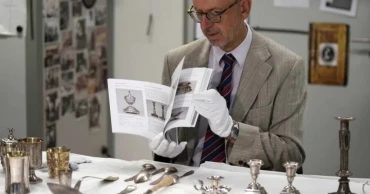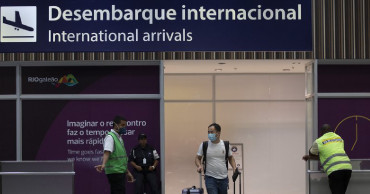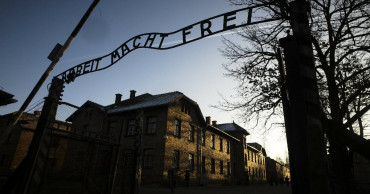Holocaust
As a stolen silver sleuth, German curator returns heirlooms Jewish families lost in the Holocaust
Matthias Weniger put on a pair of white cloth gloves and carefully lifted a tarnished silver candleholder, looking for a yellowed sticker on the bottom of it.
The candlestick is one of 111 silver objects at the Bavarian National Museum that the Nazis stole from Jews during the Third Reich in 1939. That's when they ordered all German Jews to bring their personal silver objects to pawn shops across the Reich — one of many laws created to humiliate, punish and exclude Jews.
Also Read: Holocaust survivors flee from Ukraine to Germany for safety
What started with anti-Jewish discrimination and persecution in 1933, after the Nazis were voted to power in Germany, led to the murder of 6 million European Jews and others in the Holocaust before World War II ended with Germany's surrender in 1945.
Weniger, who is a curator at the Munich museum and oversees its restitution efforts, has made it his mission to return as many of the silver objects as possible to the descendants of the original owners.
"These silver objects handed in at the pawn shops are often the only material things that remain from an existence wiped out in the Holocaust," Weniger told The Associated Press in an interview last week at the museum's workshop where he displayed some silver items that have yet to be restituted.
"Therefore it's really important to try to find the families and give back the objects to them," he added.
Also Read: Zelenskyy evokes Holocaust as he appeals to Israel for aid
Thousands of the pieces taken from the Jews were melted into around 135 tons of silver, and used to help Germany's war efforts. But several museums ended up with hundreds of silver pieces such as candlesticks used to light candles on the eve of Shabbat, Kiddush cups to bless the wine, silver spoons and cake servers.
Some of the items were returned to Holocaust survivors in the 1950s and 1960s, if they came forward and actively tried to retrieve their stolen possessions. But many former owners were murdered in the Holocaust or, if they succeeded to flee from the Nazis, had ended up in far-flung corners of the globe.
"Two thirds of the last owners did not survive the Shoah," Weniger said.
Also Read: GOP leaders condemn Greene over Holocaust comments
Despite these odds, and with a combination of thorough detective work, dedication and deep knowledge of history, Weniger has so far managed to return about 50 objects to the family members and relatives of the original owners.
He's convinced that he may be able to return almost all remaining objects by the end of this year.
First, he searches for the identity of the original owners. The little yellowed paper stickers on some of the pieces often help his efforts. They were put on the objects by the pawn shops — a testament to Germans' obsessive bureaucracy even in times of dictatorship and war. The numbers on the stickers are also listed on more than 80-year-old documents naming the Jews who had to give away their silver — sometimes beloved heirlooms that had been passed down in families for many generations.
Once Weniger discovers the names of the original owners, he starts looking up Jewish obituary and genealogy databases, in hopes that direct descendants or more distant relatives may have posted their names online.
"And so you get from one generation to the next generation and you end up with telephone books … with LinkedIn, with Facebook, with Instagram or email addresses that correspond to a member of the younger generation of that family," the researcher explained.
In most of the cases, Weniger says he gets lucky and is able to track down the right relatives.
The majority of descendants live in the United States and Israel, but the museum has already or is in the process of also restituting silver pieces to France, the United Kingdom, Australia and Mexico.
Weniger makes a point of personally delivering the pieces to the families. He traveled to the U.S. earlier this year, and last week, he returned 19 pieces to families in Israel.
There, Weniger met up with Hila Gutmann, 53, and her father Benjamin Gutmann, 86, at his home in Kfar Shmaryahu north of Tel Aviv, and gave them a small silver cup.
Weniger had managed to track down the family with the help of the tracing service of Magen David Adom — Israel's version of the International Committee of the Red Cross.
The cup was likely used for Kiddush to bless the wine on the eve of Shabbat — but nobody knows for sure because the original owners, Bavarian cattle dealer Salomon Gutmann and his wife Karolina, who were the grandparents of Benjamin, were murdered by the Nazis in the Treblinka extermination camp.
"It was a mixed feeling for us to get back the cup," Hila Gutmann said. "Because you understand it's the only thing that's left of them."
While the grandparents of Benjamin Gutmann were murdered in the Holocaust, their son Max — Benjamin's father — survived because he fled from the Nazis to the British-mandated territory of Palestine, in what is now Israel.
Despite the pain triggered by the loss and return of the silver cup, the Gutmanns say they're happy to have it back and plan to use it in a ceremony with all their other relatives on Rosh Hashanah, the Jewish New Year, in September.
As for Weniger, the bearer of the cup, the Gutmann's have nothing but praise for him and his work.
"He's really dedicated to it," Hila Gutmann said. "He treats these little objects with so much care — like they are holy."
2 years ago
Zelenskyy evokes Holocaust as he appeals to Israel for aid
Ukraine’s president on Sunday called on Israel to take a stronger stand against Russia, delivering an emotional appeal that compared Russia’s invasion of his country to the actions of Nazi Germany.
In a speech to Israeli lawmakers over Zoom, President Volodymyr Zelenskyy said it was time for Israel, which has emerged as a key mediator between Ukraine and Russia, to finally take sides. He said Israel should follow its Western allies by imposing sanctions and providing arms to Ukraine.
“One can ask for a long time why we can’t accept weapons from you or why Israel didn’t impose sanctions against Russia, why you are not putting pressure on Russian business,” he said. “It is your choice, dear brothers and sisters.”
Read:Ukraine war is backdrop in US push for hypersonic weapons
Zelenskyy, who has carefully catered a series of similar parliamentary speeches to his audiences, made frequent references to the Holocaust as he tried to rally support. The comparisons drew an angry condemnation from Israel's national Holocaust memorial, which said Zelenskyy was trivializing the Holocaust.
Zelenskyy accused Russian President Vladimir Putin of trying to carry out a “final solution” against Ukraine -- using the Nazi term for its planned genocide of 6 million Jews during World War II.
“You remember it and will never forget it for sure,” he said. “But you should hear what is coming from Moscow now. They are saying the same words now: 'final solution.' But this time it's about us, about the Ukrainian question."
Zelenskyy, who himself is Jewish, also noted that a Russian missile slammed into Babi Yar -- the spot of a notorious Nazi massacre in 1941 that now hosts Ukraine's main Holocaust memorial.
“The people of Israel, you saw how Russian rockets hit Babi Yar. You know what this place means, where the victims of the Holocaust are buried,” he said.
The use of such sensitive language was a clear attempt by Zelenskyy to connect with his audience. Israel was founded in 1948 as a refugee for Jews in the wake of the Holocaust. The country is home to tens of thousands of elderly survivors, and many of its leaders are children of survivors.
Putin has also has sought to paint his enemies in Ukraine as neo-Nazis as he tries to legitimize his war in Ukraine. But historians, noting that Ukraine is a democracy led by a Jewish president, have condemned his use of such terminology as disinformation and a cynical ploy to further the Russian leader’s aims.
Israeli Foreign Minister Yair Lapid, whose late father was a Holocaust survivor, thanked Zelenskyy for the speech.
“We will continue to assist the Ukrainian people as much as we can and we will never turn our backs to the plight of people who know the horrors of war,” Lapid said.
But Yad Vashem, Israel's national Holocaust memorial, which had previously condemned Putin's Nazi references, also harshly criticized Zelenskyy, without naming him.
“Propagandist discourse accompanying the current hostilities is saturated with irresponsible statements and completely inaccurate comparisons with Nazi ideology and actions before and during the Holocaust,” it said. "Yad Vashem condemns this trivialization and distortion of the historical facts of the Holocaust.”
Read:Shelter bombed in Ukraine city; war seen entering new phase
The Israeli public has been largely supportive of Ukraine since Russia invaded its western neighbor on Feb. 24. Several thousand people, many holding Ukrainian flags, gathered in a central Tel Aviv square to watch his speech on a large screen.
But Israel’s government has been much more cautious as it carves out a role as a mediator in the war. Prime Minister Naftali Bennett paid a surprise visit to Moscow to meet with Putin on March 5. Since then, he has spoken to the Russian leader at least twice and to Zelenskyy at least six times, according to his office.
While Israel’s foreign minister has strongly condemned the invasion, Bennett has used more tepid language to maintain an air of neutrality.
With large Jewish populations in both Ukraine and Russia, Israel is wary of antagonizing either side. Israel also has good working relations with the Russian military in neighboring Syria -- where both sides’ maintain a special hotline to make sure their air forces do not come into conflict.
Israel has delivered tons of humanitarian aid to Ukraine and is set to open a special field hospital in western Ukraine later this week. But it has rejected pleas to provide arms or impose sanctions against Russia or its oligarchs, some of whom are Jewish and have strong ties to Israel.
Zelenskyy said it was time for this to change.
“Everyone in Israel knows that your missile defense is the best. Everyone knows that your weapons are strong, everyone knows that you are great and you know how to defend your national interests, interests of your people and you can definitely help defend ours,” he said.
3 years ago
UN chief: Year 2021 must be a year of healing
UN Secretary-General Antonio Guterres has said the year 2021 must be a year of healing and healing from the pandemic and broken societies in which hatred has all too easily taken the root.
5 years ago
Facebook bans Holocaust denial, distortion posts
Facebook is banning posts that deny or distort the Holocaust and will start directing people to authoritative sources if they search for information about the Nazi genocide.
5 years ago
China's Israel envoy compares virus travel bans to Holocaust
China's acting ambassador to Israel apologized on Sunday after comparing the closure of several national borders to Chinese citizens amid fears of a new virus from China to the turning away of Jewish refugees during the Holocaust.
6 years ago
Europe's bishops mark Auschwitz anniversary denouncing hate
Europe's Catholic bishops are marking the 75th anniversary of the liberation of Auschwitz with a statement denouncing anti-Semitism and the "manipulation" of the truth for political aims.
6 years ago


.jpg)






